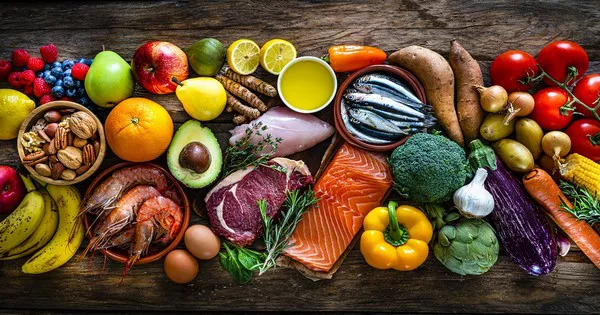Vitamin D is a vital nutrient that plays a crucial role in maintaining our overall health. Often referred to as the “sunshine vitamin,” it is essential for various bodily functions, including bone health, immune system support, and mood regulation. However, many people do not get enough of this important vitamin, which can lead to various health issues. In this article, we will explore the significance of vitamin D, its sources, and ways to incorporate it into your diet to ensure you are meeting your daily requirements.
Understanding Vitamin D
Vitamin D and Its Importance
Vitamin D is a fat-soluble vitamin that acts more like a hormone in the body. Its primary role is to regulate the absorption of calcium and phosphorus, two essential minerals for maintaining strong and healthy bones. Vitamin D also plays a pivotal role in supporting the immune system, reducing inflammation, and promoting overall well-being. Insufficient vitamin D can lead to various health problems, including weakened bones, increased susceptibility to infections, and even mood disorders like depression.
The Sunshine Connection
One of the unique aspects of vitamin D is its ability to be synthesized by the body when exposed to sunlight. When ultraviolet B (UVB) rays from the sun interact with the skin, a precursor to vitamin D is produced, which is then converted into its active form in the liver and kidneys. This is why it’s often referred to as the “sunshine vitamin.”
Natural Sources of Vitamin D
Fatty Fish: A Rich Source of Vitamin D
Fatty fish are among the most potent dietary sources of vitamin D. Salmon, mackerel, trout, and sardines are particularly high in this nutrient. Just a single serving of salmon can provide you with a significant portion of your daily vitamin D needs. To ensure you are getting the most vitamin D from your fish, opt for wild-caught varieties whenever possible.
Mushrooms: The Plant-Based Option
While vitamin D is predominantly found in animal-based foods, certain types of mushrooms are unique in that they can naturally produce vitamin D when exposed to sunlight or UV light during growth. Examples include shiitake and maitake mushrooms. These mushrooms are an excellent choice for vegetarians and vegans looking to increase their vitamin D intake.
Fortified Foods
Vitamin D in Fortified Dairy Products
In many countries, dairy products like milk, yogurt, and cheese are commonly fortified with vitamin D. This fortification is done to help individuals meet their vitamin D needs, especially in regions where sunlight exposure may be limited due to climate or lifestyle. When purchasing dairy products, look for labels indicating that they are fortified with vitamin D.
Breakfast Cereals and Orange Juice
In addition to dairy, various breakfast cereals and orange juice products are also fortified with vitamin D. These fortified options can be a convenient way to increase your daily intake, especially if you’re not a fan of fish or dairy.
Vitamin D Supplements
Supplementing with Vitamin D
For individuals who have difficulty getting enough vitamin D through their diet and sunlight exposure, vitamin D supplements are widely available. These supplements come in various forms, including vitamin D2 (ergocalciferol) and vitamin D3 (cholecalciferol). Vitamin D3 is generally considered more effective at raising blood levels of vitamin D and is the preferred choice for supplementation.
Consulting a Healthcare Professional
Before starting any supplementation regimen, it’s crucial to consult with a healthcare professional, such as a doctor or registered dietitian. They can assess your individual needs and recommend the appropriate dosage to address any deficiencies you may have without risking vitamin D toxicity.
The Role of Vitamin D in Bone Health
Vitamin D and Calcium Absorption
One of the primary functions of vitamin D is to enhance the absorption of calcium from the intestines. Without adequate vitamin D, your body may struggle to absorb enough calcium, leading to weak and brittle bones. This is especially critical during childhood and adolescence when bones are growing and developing.
Preventing Osteoporosis
Vitamin D is essential throughout life to maintain bone health. Insufficient vitamin D can lead to conditions like osteoporosis, a disease characterized by weakened bones that are more susceptible to fractures. Osteoporosis is more common in older adults, particularly postmenopausal women, making vitamin D intake even more crucial for this demographic.
Vitamin D and Immune Function
Enhancing Immune Response
Vitamin D also plays a crucial role in supporting the immune system. It helps activate the body’s innate and adaptive immune responses, making it more effective at defending against pathogens like viruses and bacteria. Studies have shown that individuals with adequate vitamin D levels may have a reduced risk of respiratory infections and autoimmune diseases.
Inflammation and Vitamin D
Moreover, vitamin D has anti-inflammatory properties. It helps regulate the production of inflammatory proteins in the body, which can reduce the risk of chronic inflammation—a factor associated with various diseases, including heart disease and cancer.
Vitamin D and Mood Regulation
The Sunshine Vitamin and Mood
Vitamin D’s influence extends beyond physical health; it also has a significant impact on mental well-being. Research has suggested a link between vitamin D deficiency and mood disorders like depression and seasonal affective disorder (SAD). While the exact mechanisms are still being studied, it is thought that vitamin D may play a role in regulating neurotransmitters that affect mood.
The Importance of Sunlight
SAD, in particular, is often associated with reduced sunlight exposure during the winter months when days are shorter, and people spend more time indoors. This lack of sunlight can lead to lower vitamin D levels, which, in turn, may contribute to the onset of SAD symptoms.
Assessing Your Vitamin D Needs
Factors Affecting Vitamin D Requirements
Determining your vitamin D needs can be influenced by several factors, including your age, sex, skin tone, geographical location, and lifestyle. For instance, individuals with darker skin may require more sun exposure to produce an adequate amount of vitamin D, as melanin, the pigment responsible for skin color, can reduce the skin’s ability to synthesize vitamin D.
The Role of Geographic Location
Geographic location is another important factor. People who live in regions with limited sunlight, such as northern latitudes during the winter months, may be at a higher risk of vitamin D deficiency. In such cases, dietary sources and supplements become even more critical.
Getting Enough Vitamin D: Dietary Recommendations
Recommended Dietary Allowances (RDAs)
The Recommended Dietary Allowance (RDA) for vitamin D varies by age and life stage. Here are the general RDAs set by the Institute of Medicine (IOM) for vitamin D intake:
Infants (0-12 months): 400-1,000 IU (10-25 mcg) per day
Children (1-18 years): 600-1,000 IU (15-25 mcg) per day
Adults (19-70 years): 600-800 IU (15-20 mcg) per day
Adults (71 years and older): 800-1,000 IU (20-25 mcg) per day
Pregnant and lactating women: 600-800 IU (15-20 mcg) per day
Upper Intake Levels (ULs)
It’s important to note that excessive vitamin D intake can lead to toxicity, which can result in adverse health effects. The IOM has established Upper Intake Levels (ULs) to help individuals avoid vitamin D toxicity. The UL for vitamin D for most adults is set at 4,000 IU (100 mcg) per day.
Incorporating Vitamin D into Your Diet
Foods Rich in Vitamin D
Incorporating vitamin D-rich foods into your diet can help you meet your daily requirements. Here are some dietary sources to consider:
Salmon: Salmon is an excellent source of vitamin D, with a 3.5-ounce (100-gram) serving providing approximately 570 IU (14 mcg).
Mackerel: Mackerel is another fatty fish that is high in vitamin D, offering around 360 IU (9 mcg) per 3.5-ounce (100-gram) serving.
Sardines: A 3.5-ounce (100-gram) serving of canned sardines provides approximately 480 IU (12 mcg) of vitamin D.
Shiitake Mushrooms: These mushrooms can provide about 40 IU (1 mcg) of vitamin D per 3.5-ounce (100-gram) serving when exposed to UV light during growth.
Fortified Foods: Many dairy products, breakfast cereals, and orange juice are fortified with vitamin D, offering a convenient way to boost your intake.
Egg Yolks: While not as high in vitamin D as fish, egg yolks can contribute some vitamin D to your diet.
Cod Liver Oil: A single tablespoon of cod liver oil can provide an impressive 1,360 IU (34 mcg) of vitamin D.
Combining Dietary Sources
To ensure you are getting enough vitamin D from your diet, consider incorporating a variety of these foods into your meals. For example, you might enjoy a salmon fillet with sautéed shiitake mushrooms and a glass of fortified orange juice for breakfast. This combination can help you meet your daily vitamin D needs in a delicious and nutritious way.
Conclusion
Vitamin D is a vital nutrient that plays a multifaceted role in maintaining our health, from supporting strong bones to enhancing immune function and regulating mood. While sunlight is a natural source of vitamin D, it’s essential to also include dietary sources and supplements as needed to ensure you meet your daily requirements. By incorporating vitamin D-rich foods into your diet and consulting with a healthcare professional if necessary, you can take proactive steps to optimize your vitamin D status and promote overall well-being. So, make sure to prioritize vitamin D in your daily diet and lifestyle choices to reap the numerous health benefits it offers.
[inline_related_posts title=”You Might Be Interested In” title_align=”left” style=”list” number=”6″ align=”none” ids=”2506,2661,2673″ by=”categories” orderby=”rand” order=”DESC” hide_thumb=”no” thumb_right=”no” views=”no” date=”yes” grid_columns=”2″ post_type=”” tax=””]


































